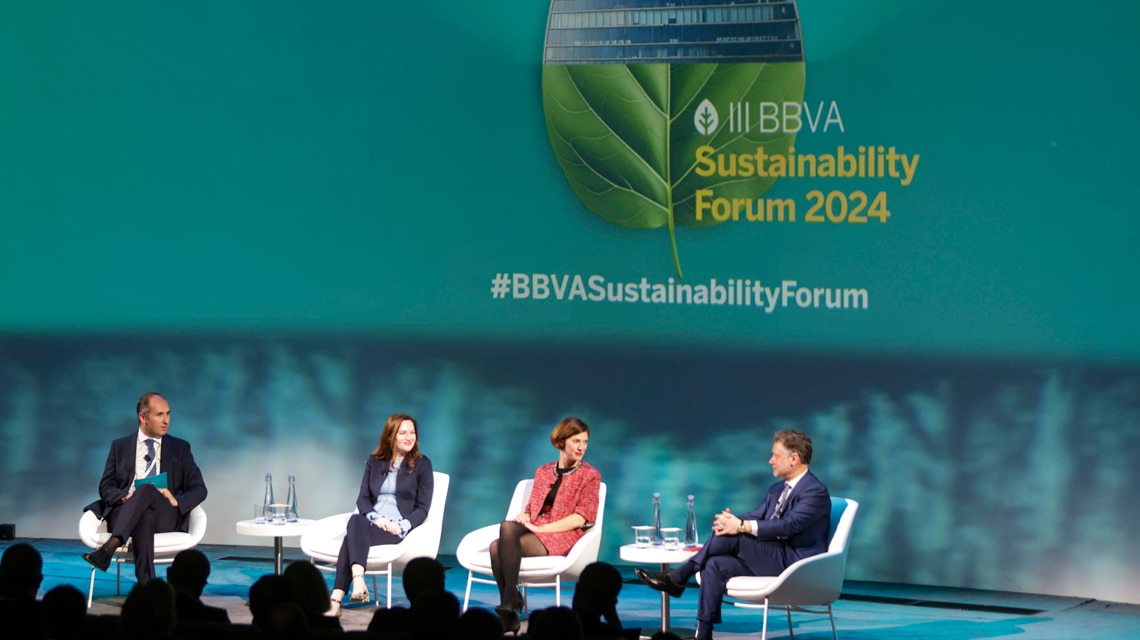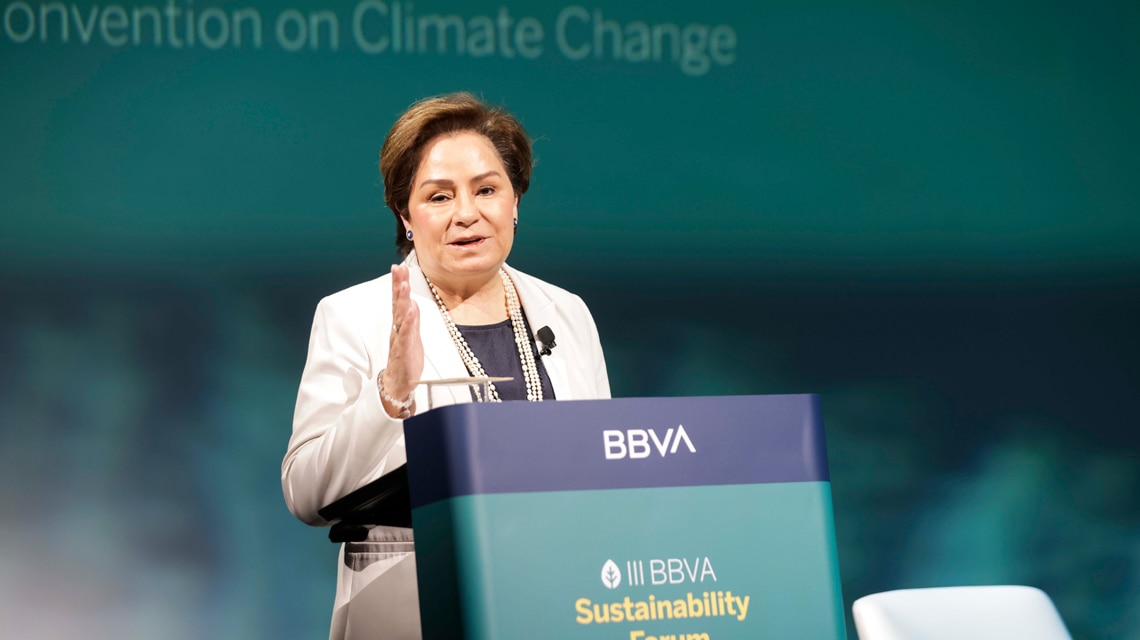New clean technologies, or 'cleantech,' will play a key role in the decarbonization of the economy. To make this possible, however, the private sector must make a firm commitment to the sustainable agenda, leading to decisive, long-term investment in firms that develop clean technologies. These were the points emphasized by speakers at the 3rd BBVA Sustainability Forum, which the bank held in the auditorium of Ciudad BBVA, Madrid, Spain, with a livestream feed. 'Opportunity' was a key word in almost every speech.

Press kit
By funding the development of new clean technologies, the financial sector is one of the major drivers of this emerging industry. These were the words of Lei Zhang, CEO of Envision, one of the world's largest conglomerates in the new energy technologies space, during a talk with BBVA Chair Carlos Torres Vila at the 3rd BBVA Sustainability Forum. The BBVA event, which welcomed more than 400 attendees, including government representatives, opinion leaders and global companies and institutions that are strongly committed to the fight against climate change and the promotion of inclusive growth, has become a milestone venue for high-level dialogue on the economic and social challenges of sustainability.
The Envision CEO explained that banks can play a role, for example, by helping their corporate clients achieve net-zero emissions or providing them with digital and hardware solutions. "That's why I think more innovation should happen in the financial sector," Zhang said. Envision implements leading green technology projects around the world. The company has launched investments in Spain that will reach €4 billion over the next few years, including the upcoming construction of a battery gigafactory in Cáceres province. Lei Zhang's Extremadura commitment was widely appreciated by the attendees.
Carlos Torres Vila insisted on the importance of investing in technology to become competitive in the sustainable transition. "At BBVA we believe in innovation as a lever to achieve decarbonization,” he said. He also announced that the bank is expanding its sustainable business offering with the creation of a global unit to finance cleantech innovation. The new venture, based in New York, London and Madrid, will provide lending and advisory services.
Onur Genç: why sustainability must make economic sense
Opening the event, Onur Genç, the BBVA CEO, spoke on the investment figures needed to address the major sustainable challenges and bring about a profound economic transformation: $275 trillion by 2050 for climate change mitigation; $27 trillion annually over the next decade for natural capital protection; and $37 trillion by 2030 to drive inclusive growth. This far-reaching global transformation, he said, will only occur if two conditions are met: "Companies, investors and citizens will not make large-scale changes in their behavior unless these make economic sense. We will succeed only if everyone contributes to the solution.” Part of the solution are emerging markets and developing economies (EMDEs). Developed economies, Genç noted, must establish mechanisms to attract private capital to EMDEs and help close their financing gap in the Sustainable Development Goals, which currently stands at $3.9 trillion according to OECD data.

Onur Genç, BBVA CEO, at the III BBVA Sustainability Forum.
Onur Genç also sought to emphasize the role of the public sector as a driver of policies that consider the supply side as well as the demand side. Governments should introduce robust regulations that help the start-ups that will develop the technologies needed for change.
The BBVA CEO reminded the audience that banks are key intermediaries: they can help their customers invest in this transition and lead it successfully, together with society as a whole, with both sustainable finance solutions and advisory services.
Genç explained that sustainability is one of BBVA's strategic priorities. This is due to the bank's duty to society and to the risk management requirements incumbent upon a financial institution. Moreover, sustainability is "one of the greatest business opportunities of this century."
A major challenge, strong capacity to act
In fact, the word ‘opportunity’ was one of the main protagonists of the day. Patricia Espinosa, former Executive Secretary of the United Nations Framework Convention on Climate Change, explained that public and private interests must be reconciled for the climate crisis, both in the short and long term. Espinosa underscored that moving toward a sustainable economic model represents major opportunities for those who develop creative technological solutions in fields such as the energy transition, the development of sustainable food systems, nature conservation, the transformation of cities and transportation. The private sector is called upon to play a central role. “The challenge is enormous, but so is our ability to act,” she stressed.

Patricia Espinosa.
In a presentation entitled ‘Sustainability as a business and global challenge,’ Javier Rodríguez Soler, Global Head of Sustainability and CIB at BBVA, interviewed the Chair of Iberdrola. Ignacio Galán put the spotlight on electrification, which he called ‘unstoppable’ and celebrated that Europe is a pioneer in promoting decarbonization and creating opportunities in this area.

Ignacio Galán and Javier Rodríguez Soler.
Galán also insisted that Europe has technological advances in the renewable energy field that could be exported to the rest of the world. Incentives and adequate investments by governments and regulators are needed in order to continue developing them to optimize energy consumption.
Meanwhile, Antoni Ballabriga, Global Head of Sustainability Intelligence at BBVA, spoke with Juan Verde, an environmental advisor in the Biden Administration, who noted that with the Inflation Reduction Act (IRA), the sustainable agenda in the U.S. “is a matter of speed, but no longer a matter of direction.” The IRA represents the largest public investment in the energy sector for the U.S. economy. The incentive system this law has established for U.S. companies to operate in nearby geographic regions is making ‘nearshoring’ turn into a ‘friendshoring’, as Verde called it, as markets with cultural, historic, logistic and strategic affinity become industrial and commercial allies.

Juan Verde and Antoni Ballabriga.
Channeling capital and creating jobs
Climate funds also had their place in the forum. The panel moderated by Antonio Bravo, BBVA's Global Head of Sustainability Strategy and CIB, featured Meghan Sharp, CEO of Decarbonization Partners; Pierre-Etienne Franc, CEO of Hy24; and Julia Reinaud, European Head of Bill Gates' Breakthrough Energy fund. The experts emphasized that there is a need to know how to steer funding toward technologies that are going to have a real impact. They also pointed out the need to support the scale-up of early-stage companies that develop these technologies, to address the challenges of talent shortages and high-quality job creation, and to bring regulators into the conversation so that they can help stimulate the ecosystem.

Antonio Bravo, Meghan Sharp, Pierre-Etienne Franc y Julia Reinaud.
The challenges of access to professional talent and rapid channeling of capital to accelerate technological developments were also addressed in another of the afternoon round tables, 'Benchmark practices in corporate and institutional sustainability in Spain.' During the discussion, moderated by Peio Belausteguigoitia, BBVA country manager in Spain, panel members Martín Fernández Prado, chairman of the Port Authority of A Coruña, Sara Ramis, Chief Client, Marketing and Sustainability Officer of the Barceló Group, and Santiago Seage, CEO of Atlantica Sustainable Infrastructure, explained how their organizations are positively impacting the maritime, tourism and renewable energy sectors.

Peio Belausteguigoitia, Martín Fernández Prado, Sara Ramis and Santiago Seage.
A sustainability forum that turns out to be... sustainable
The third annual BBVA Sustainability Forum is the first such event held at Ciudad BBVA, the bank's Madrid headquarters, to earn Eventsost's E-089-24 certification as a sustainable event. This certification process, conducted in cooperation with independent auditors, enables companies to prove their compliance with the key sustainable best practices accepted by the international events community.
The 3rd BBVA Sustainability Forum has achieved the highest standards in carbon footprint calculation and offset, use of seed paper in access accreditations, priority for digital communication over print, catering choices that prioritized local and seasonal products and use of biodegradable packaging, and social inclusion policies in the hiring of support staff, thus creating job opportunities for vulnerable groups.